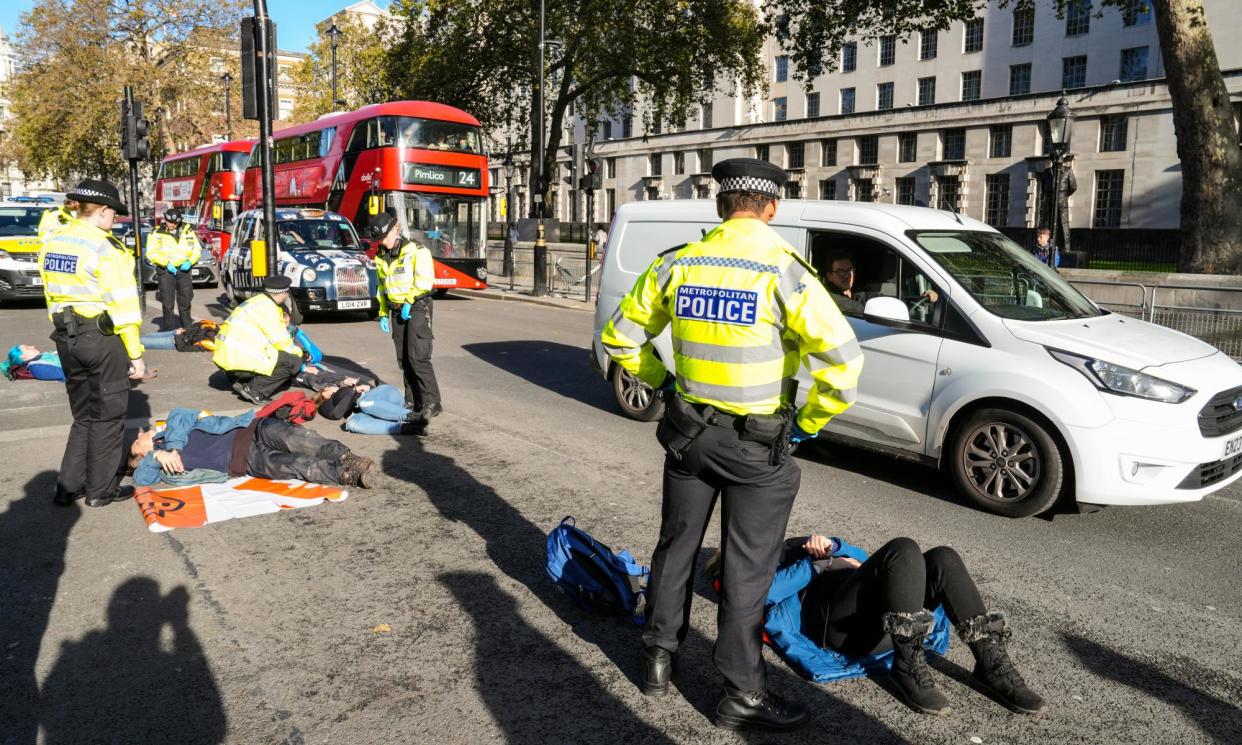UN expert condemns UK crackdown on environmental protest

A severe crackdown on environmental protest in Britain with “draconian” new laws, excessive restrictions on courtroom evidence and the use of civil injunctions is having a chilling impact on fundamental freedoms, the United Nations special rapporteur has said.
As the world faces a triple planetary crisis of climate change, biodiversity loss and pollution, environmental protesters were acting for the “benefit of us all” and must be protected, Michel Forst, the UN special rapporteur on environmental defenders, said on Tuesday.
Forst said that during a two-day visit to the UK earlier this month he uncovered worrying information on the treatment of peaceful protesters.
Rules imposed on defendants in one London court have prevented them from explaining their motivations to the jury. At Inner London crown court, peaceful protesters have been forbidden by court order from mentioning the climate crisis, fuel poverty or even the US civil rights movement in their statements to the jury.
“It is very difficult to understand what could justify denying the jury the opportunity to hear the reason for the defendant’s action, and how a jury could reach a properly informed decision without hearing it, in particular at the time of environmental defenders’ peaceful but ever more urgent calls for the government to take pressing action for the climate,” Forst said.
He said the prosecution of peaceful protesters under “regressive” new public nuisance laws in the Police, Crime, Sentencing and Courts Act 2022, which carried a 10-year sentence, and the use of the Public Order Act 2023 was criminalising peaceful demonstrations.
Forst highlighted the case of a peaceful protester jailed in December for six months for walking slowly down a road for 30 minutes during a climate protest under the new public order law.
“It is important to highlight that, prior to these legislative developments, it had been almost unheard of since the 1930s for members of the public to be imprisoned for peaceful protest in the UK,” said Forst, in a statement issued on Tuesday morning. “I am therefore seriously concerned by these regressive new laws.”
Forst also picked out the harsh bail conditions imposed on climate activists for peaceful protests. These include being forced to wear tags while awaiting trial, restrictions on movement, and bans on speaking to other environmental activists.
“Some environmental defenders have also been required to wear electronic ankle tags, some including a 10pm-7am curfew, and others, GPS tracking,” said Forst. “Under the current timeframes of the criminal justice system, environmental defenders may be on bail for up to two years from the date of arrest to their eventual criminal trial.
“Such severe bail conditions have significant impacts on the environmental defenders’ personal lives and mental health, and I seriously question the necessity and proportionality of such conditions for persons engaging in peaceful protest.”
He condemned the widespread use of civil injunctions to stop peaceful protest and the “toxic” discourse in the media and among politicians about climate protesters.
“The toxic discourse may also be used by the state as justification for adopting increasingly severe and draconian measures against environmental defenders,” he said.
“In the course of my visit, I witnessed first-hand that this is precisely what is taking place in the UK right now. This has a significant chilling effect on civil society and the exercise of fundamental freedoms.”
Forst said he was speaking out because of the gravity of his concerns about the widespread restrictions on peaceful protest. His investigations are ongoing as he considers formal complaints about treatment that have been submitted to him.
He called for a constructive dialogue with the Conservative government to ensure that members of the public seeking to protect the environment were not subject to persecution, penalisation or harassment for doing so.


